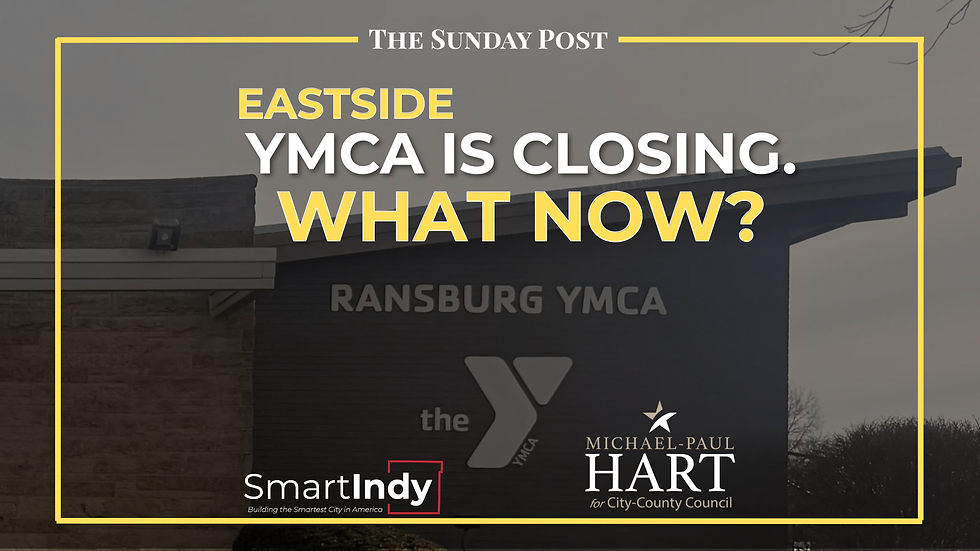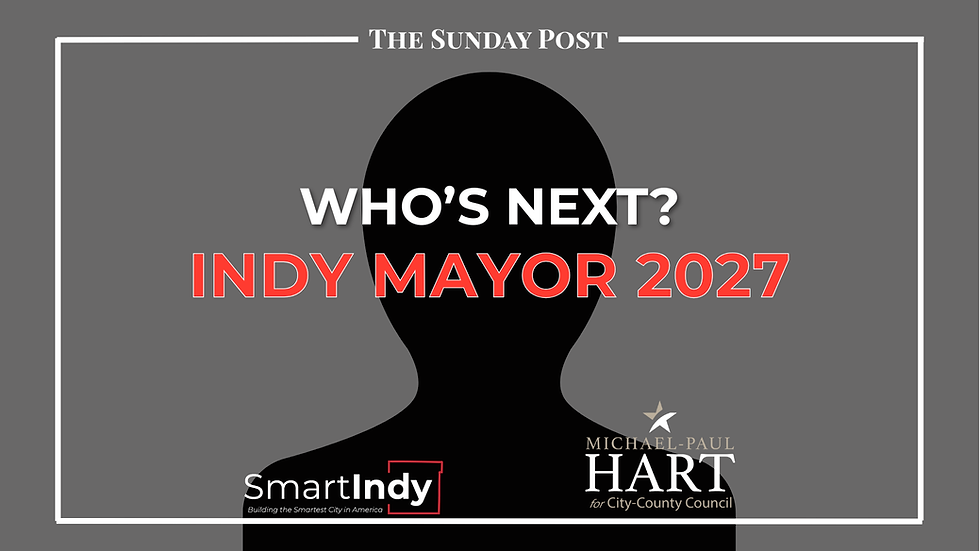Update on Indy – August 24, 2025: Google Data Center, Washington Square, and Smarter Health Spending
- Michael-Paul Hart
- Aug 24, 2025
- 4 min read
By Councilor Michael-Paul Hart
Working to Make Indianapolis the Smartest City in America
Washington Square Mall & Target

This week, I sat down with the government affairs team from Target to discuss repeated water main breaks at Washington Square Mall. They’ve struggled to get any response from the property owners, Durga Properties, despite clear violations of agreements.
I immediately elevated the issue with Dr. Virginia Caine at the Health Department, who is now bringing her team in for a deeper review. My goal is straightforward: get Durga’s leadership to the table here in Indianapolis — alongside city leaders, DMD, and Target to finally address the
mall’s decline and hold the owners accountable.
Learning from Success Stories
Over the past few weeks, as recently as this Monday, I’ve also met twice with Hendricks Commercial Properties, the group leading the redevelopment of the Circle Centre Mall downtown (see renderings here). Their approach, blending retail, residential, and community space, offers valuable lessons for what’s possible on the Eastside.
The Eastside deserves the same kind of bold thinking and responsible ownership. That’s why I am pushing for real accountability at Washington Square and learning from successful models that are transforming other parts of our city.
I am leading these efforts because accountability and community investment are at the heart of building the Smartest City in America.
MDC Hearing: Google Data Center
On August 20, the Metropolitan Development Commission voted to advance zoning for the proposed Google data center. While more than 100 residents turned out and made one of the most compelling community presentations I’ve seen in six years, the MDC still approved the project.
This isn’t the end. At our next full Council meeting in September, I will call down the MDC’s decision, forcing a full Council hearing where both sides can be heard again before any final zoning approval.
Transparency, smart development, and respect for residents must guide this decision. I am fighting for our neighborhoods to make sure growth is done the right way.
Data Center Examples Provided by the Petitioner


The Process Moving Forward

Key steps and statutory references
MDC public hearing and certification – The plan commission (MDC) must hold a public hearing within 60 days on a proposed zone‑map change and then certify the proposal to the Council.
Council first regular meeting (“call‑down” decision) – At the first regular Council meeting after certification, the Council may, by a majority of those voting, schedule the proposal for a public hearing (the “call‑down”).
If the Council fails to schedule a hearing, the ordinance takes effect as if adopted at that first meeting.
Public hearing and final action deadline – When a hearing is scheduled, the Council must set the date and announce the details (date, time, place, description, and that written objections will be heard). The Council must act by the final action date, which is 30 days after certification or the second regular meeting, whichever is later. If the Council fails to act by then, the ordinance takes effect automatically.
Council final decision (3/5 vote) – After the hearing, the Council may adopt, reject, or amend the proposal. Action requires a three‑fifths (3/5) vote of the full
Adopt – If adopted as certified, the ordinance is enacted
Reject – If rejected, the proposal is defeated
Amend – If amended, the proposal goes back to the plan commission. The commission has 45 days to approve or disapprove. If it approves or fails to act, the ordinance stands as amended; if it disapproves, the Council must reconfirm its amendment within 45 days or the ordinance takes effect
Community Health Network & Public Safety
In preparing for next week’s Public Safety Committee meeting, I met with Community Health Network to better understand how county income tax dollars support health services in Marion County.

They already provide mobile recovery units, transitional housing, inpatient and outpatient behavioral health care, and 24-hour crisis response (learn more here). These are many of the same services the Mayor’s Office of Public Health and Safety (OPHS) are duplicating.
My focus is making sure the County gets the most out of existing providers, avoids waste, and delivers the most efficient, effective health services possible.
❤️ Honoring Marilyn Riggs❤️

Finally, I want to pause and honor the life of Marilyn Riggs, a proud Eastsider who passed away at age 94. For decades, Marilyn was a pillar in our community: a devoted librarian at Grassy Creek Elementary, an active voice in the community during the 70s, 80s, and 90s, and a tireless advocate for responsible city government.

Her family will celebrate her life on August 31st at 3 PM at Good Shepherd United Methodist Church (2015 S. Arlington Ave).
Marilyn’s life reminds us of what it means to give back, build community, and invest in the future. Leaders like her helped lay the foundation for what we are now building: Smartest City in America.

Thank you for reading and for supporting common‑sense leadership. Together, and with the community driving accountability, we are turning bold ideas into real‑world results.
Accountability, Transparency and Local Leadership
See you next week with more updates from the Neighborhood.






Commenting on the Google Data Center. You should do your homework and due diligence on the effects of these data centers on water use and electricity use. I lived most of my life in Loudoun County Va. It is known as the Cloud Capitol of the World. Loudoun and other counties that have welcomed these data centers are finding over the long term they aren't good decisions. They use up all the electricity and use a lot...a lot of water. It seems that Indiana actually pays the data center developers to build which is completely wrong. There should be NO tax breaks for these structures. They will have 50 workers or less and the only reason Loudoun liked t…